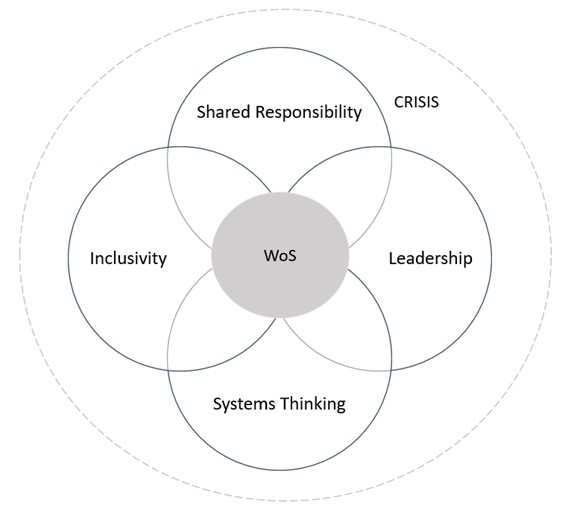Senni Määttä
I have been interested in the journey of papers from the initial idea to publication, the behind-the-scenes evolution of papers. As I recently published my own first paper, I thought it would be interesting to reflect on the journey of that paper. The fact that this was an Early Stage Researcher’s first paper perhaps brings an extra flavour to this journey (the abstract and a link to the paper are at the end of this post).
The idea for the paper came to me in the summer of 2020 while reading about Irish energy and climate policies, particularly the 2014 Green Paper, the 2015 White Paper and the 2019 Climate Action Plan. I came across discourses highlighting shared responsibility, Irish energy citizens and collaborative action across Ireland to achieve the energy transition. This piqued my interest, and I went on to investigate these topics further, identifying other features attached to this. I started to call this a Whole-of-Society (WoS) approach, despite not knowing much more about what this could be.
The next step was to find out how energy transition research had engaged with this concept. I found plenty of research on energy citizenship, prosumers and citizen participation, and collaborative and participatory governance. All of these talked about similar issues, but I felt they missed crucial points or gave only a part of the whole picture. They did not talk about exactly the same approach I had witnessed in these discourses, but were still part of the same broad discussion.
Then I tried a simple Google search with the term Whole-of-Society approach. This resulted in finding multiple World Health Organization (WHO) and United Nations (UN) guidance using the term. Further literature searches with different search tools (Science Direct, Scopus, Web of Science) resulted in finding limited academic engagement on the approach, mostly on health-related topics. The same WHO and UN documents popped up throughout this research as key citations. Browsing through this literature led to finding more similarities with the approach described in the Irish energy transition discourse and the WoS approach.
However, I did not find a comprehensive definition for what the WoS approach is, or any research related to the energy transition. This opened up my understanding of the topic further, and it became clear to me that I should write about this concept. The topic of my PhD is governmentality of public participation in the energy transition, and because of this, WoS approach was clearly a key concept that could help me in my wider research. I felt the WoS approach could offer some insights if linked to energy transitions, and this is what I aimed to do with the paper.
Scotland provided a suitable case example alongside the Irish case. The Scottish energy and climate policy also align with the WoS approach but provide interesting points of divergence compared to the Irish example, teasing out different aspects of the WoS approach to the energy transition. I also identified international level documents from EU and UN which were analysed for the first version of the paper, although these were dropped following peer-review comments that suggested that this discussion needed to be more focused.
The conceptual development of the WoS approach moved back and forth with the literature on WoS and the case examples, every round bringing more depth and detail to the concept and analysis. The concept provided large number of possible avenues for investigation and one key challenge throughout the paper writing process was how to decide which one to explore. I found it challenging to rein in some of my more ambitious goals for the paper and leave these for my subsequent research, and the peer-review process was a significant help with this. The paper first went through major revisions, and then minor revisions before acceptance, with four reviewers in the first round and three in the second. I was fortunate to have the paper accepted by my first choice of a journal.
Writing my first paper as a sole author was a challenge. Learning the (unwritten) craft of writing a paper, the style, the choice of words, the way of framing issues, ended up being the hardest part of it all, and sometimes confusing as well. In this, having a great PhD supervisor was crucial (and something I am very thankful for). Another key lesson from the process was that publishing a paper took longer than I expected despite all warnings but was a very rewarding process. Overall, I am very grateful for all the help and engagement I received with the paper. I learned immensely throughout the process, and I am excited to see how the energy transition research community engages with the WoS approach, because I believe that the concept has significant potential for understanding how to progress the energy transition.

Link to the publication: https://www.sciencedirect.com/science/article/abs/pii/S2214629621003704?dgcid=author
Abstract: This paper suggests that some countries are adopting a range of measures for the energy transition that amount to a Whole-of-Society Approach, formerly deployed as a response to health crises and other emergencies. Despite having a range of governance implications, the main features of the approach have not been effectively described nor critically evaluated. This paper seeks to draw out the main characteristics of the approach based on a review of literature that uses the whole-of-society approach term. This suggests that the Whole-of-Society Approach has five key components: crisis; shared responsibility; inclusivity; leadership; and systems thinking. This paper then explores how these components have been reflected in energy transition policy discourse in the Republic of Ireland and Scotland, by analysing key policy documents. By highlighting how the Whole-of-Society Approach is used as a wider framework for the energy transition, the paper aims to stimulate further research on the wider implications, coherence, and effectiveness of the approach in progressing the energy transition.

Comments have been closed/disabled for this content.